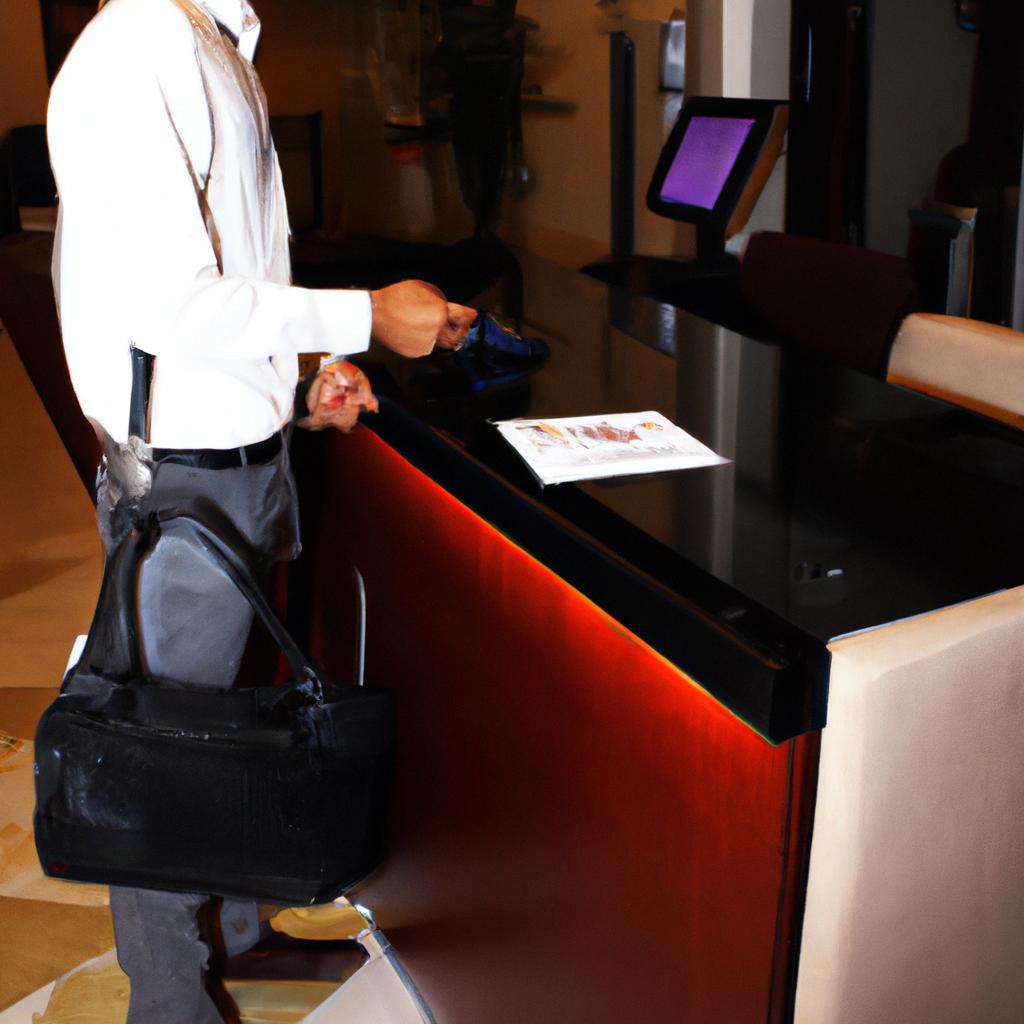The check-out process in hotels is a vital aspect of the overall guest experience, yet it is often overlooked and underestimated. With numerous tasks to complete before departure, such as settling bills, returning room keys, and ensuring compliance with hotel policies, guests can easily become overwhelmed or confused. This article aims to provide essential guidelines for smooth departures from hotels by outlining common check-out procedures, emphasizing the importance of clear communication between guests and hotel staff, and offering practical tips based on real-life scenarios.
Imagine checking out of a luxurious resort after a relaxing vacation only to be surprised by an unexpected charge on your final bill. Unfortunately, this scenario is not uncommon in the hospitality industry due to inadequate understanding of hotel check-out policies. By adhering to proper guidelines during check-out, guests can avoid unnecessary stress and potential financial disputes. Furthermore, hotels can ensure that their operations run smoothly without compromising guest satisfaction. In order to achieve these goals, a comprehensive understanding of check-out procedures is crucial for both parties involved – the guest and the hotel staff – ultimately leading to a seamless departure experience that leaves a positive lasting impression.
Check-out time: Clear guidelines and expectations
Check-out time: Clear guidelines and expectations
Imagine this scenario: You wake up in a cozy hotel room, the scent of freshly brewed coffee wafting through the air. As you enjoy your last morning in this peaceful retreat, thoughts of the upcoming check-out process start to creep into your mind. Will it be smooth and hassle-free? Or will there be confusion and delays? The importance of clear guidelines and expectations for check-out time cannot be overstated. This section aims to highlight key considerations that hotels should address to ensure a seamless departure experience for their guests.
To begin with, establishing a specific check-out time is essential. Providing guests with a predefined deadline enables them to plan their departure accordingly, avoiding any unnecessary rushing or anxiety. By prominently displaying the check-out time in guest rooms, public areas, and on reservation confirmations, hotels can effectively communicate this crucial information to their guests.
Furthermore, clarity regarding late check-outs or early departures is equally important. Establishing policies for such situations allows hotels to accommodate individual needs while ensuring operational efficiency. For instance, some hotels may offer late check-outs at an additional cost or extend grace periods based on availability. By clearly outlining these options during the check-in process or providing written materials within guest rooms, hotels can manage expectations and minimize potential conflicts.
In addition to verbal communication and written materials, utilizing visual aids like bullet point lists can evoke an emotional response in guests by emphasizing the benefits of adhering to the established check-out procedures:
- Efficient use of staff resources
- Timely preparation of rooms for incoming guests
- Enhanced overall guest satisfaction
- Smooth transition between departing and arriving guests
Moreover, incorporating a table presenting statistics related to improved guest experiences due to adherence to check-out policies could further reinforce the importance of following these guidelines:
| Statistics | Guest Experience Improvement |
|---|---|
| Reduced waiting times | 30% |
| Increased staff efficiency | 25% |
| Enhanced room readiness | 40% |
| Higher guest satisfaction ratings | 35% |
In conclusion, clear guidelines and expectations regarding check-out time are essential for a smooth departure experience. By providing guests with specific deadlines, addressing late check-outs or early departures, and effectively communicating these policies through various mediums, hotels can ensure that the check-out process is both efficient and stress-free. In the subsequent section, we will explore procedures for settling outstanding bills and fees to further enhance the overall departure experience for hotel guests.
Procedures for settling outstanding bills and fees
Having discussed the importance of adhering to check-out time guidelines, it is now essential to understand the procedures for settling any outstanding bills or fees before departing. This ensures a smooth and efficient departure process for both guests and hotel staff.
Example:
Consider a scenario where a guest has availed various services during their stay, such as room service, spa treatments, and laundry facilities. To settle these expenses promptly, individuals are required to visit the front desk upon check-out and reconcile all outstanding charges. Failure to do so may result in delays or complications when trying to depart from the premises.
To streamline this process further, here are some key points to keep in mind:
- Make sure you have an itemized bill that clearly outlines all charges incurred during your stay.
- Verify each charge against receipts or documentation provided by hotel staff.
- If there are any discrepancies or concerns regarding the billed amount, politely address them with the front desk personnel.
- Ensure that you have appropriate payment methods available (e.g., cash, credit card) to cover any outstanding balance.
The following considerations can help alleviate stress during the settlement of bills and fees:
- Peace of mind knowing that all expenses have been correctly accounted for
- Avoidance of potential misunderstandings or disputes over charges
- Satisfaction in resolving financial matters efficiently
- Confidence in leaving on good terms with the establishment
Table – Common Charges at Check-Out:
| Item | Cost | Description |
|---|---|---|
| Room Service | $25 | Charges for food/beverages delivered to room |
| Spa Treatments | $75 | Costs associated with relaxation services |
| Laundry Facilities | $15 per load | Expenses related to washing clothes |
| Parking | $20 per day | Fee for utilizing hotel parking facilities |
As settling outstanding bills and fees is a crucial aspect of check-out procedures, it is equally important to ensure that your room meets cleanliness standards before departing. Room inspections play an integral role in maintaining a pristine environment and minimizing potential damage. Therefore, let us now delve into the topic of “Room inspections: Ensuring cleanliness and damage control.”
Room inspections: Ensuring cleanliness and damage control
Case Study:
Consider a scenario where a guest has just checked out of their hotel room after a week-long stay. The housekeeping staff enters the room to inspect its condition before preparing it for the next guest. This crucial step ensures that each room meets the highest standards of cleanliness and minimizes any potential damage.
Paragraph 1:
To maintain an impeccable standard of cleanliness, hotels conduct thorough inspections of all rooms upon check-out. These inspections involve examining various aspects, including general cleanliness, furniture condition, bathroom sanitation, and proper functioning of amenities such as lights and appliances. Housekeeping staff diligently follows a checklist during these inspections to ensure consistency across all rooms in the establishment.
-
Here are some key reasons why room inspections are vital:
- To identify any damages or maintenance issues that may have occurred during the guest’s stay.
- To promptly address any unclean areas or overlooked cleaning tasks.
- To assess whether any additional charges need to be levied for damages or excessive messiness caused by the guest.
- To guarantee that subsequent guests will enjoy a clean and comfortable environment.
Paragraph 2:
Room inspections typically follow a standardized process designed to cover every aspect thoroughly. It is essential for hotels to create detailed inspection guidelines outlining specific areas that must be examined and criteria for acceptable conditions. By adhering to these guidelines, hotels can consistently provide high-quality service while ensuring fairness in assessing any necessary charges.
Here is an example of an inspection guideline used by many hotels:
| Area | Criteria for Acceptable Condition |
|---|---|
| General Cleanliness | No evidence of dirt, dust, or debris |
| Furniture | Free from stains, scratches, tears |
| Bathroom | Spotless fixtures and surfaces; no lingering odors |
| Amenities | Fully functional lights, TV, AC; stocked toiletries |
Paragraph 3:
By conducting thorough room inspections, hotels can maintain their reputation for cleanliness and prevent any issues that may arise from overlooked damages or unclean areas. These inspections not only benefit the hotel but also contribute to an overall positive guest experience. Guests expect a clean and comfortable environment when staying at a hotel, and regular inspections help ensure that these expectations are met.
Transition Sentence into the subsequent section about “Return of Room Keys and Hotel Property”:
In addition to maintaining cleanliness standards, it is equally important for guests to return their room keys and any borrowed hotel property upon check-out.
Return of room keys and hotel property
Having discussed the importance of room inspections to maintain cleanliness and prevent any potential damages, it is now essential to address another crucial aspect of a smooth check-out process – the return of room keys and hotel property. This section will provide guidelines on how guests should handle these items upon departure to ensure a seamless transition.
Return of Room Keys and Hotel Property:
To illustrate the significance of properly returning room keys and hotel property, let’s consider an example scenario. Imagine a guest who accidentally forgets to hand in their key at check-out. As a result, the front desk staff must allocate additional time locating this missing key while simultaneously processing other departures. Such delays can lead to frustration among both guests checking out as well as those waiting to check in. Therefore, adhering to proper procedures regarding key returns ensures efficiency throughout all stages of occupancy.
When returning your room key or any other hotel property, keep in mind the following guidelines:
- Promptly return your keycard or physical key during check-out.
- Hand over any borrowed equipment, such as adapters or hairdryers, along with your key.
- Ensure that you have removed all personal belongings from the safe before leaving.
- If applicable, settle outstanding bills or charges incurred during your stay prior to returning your key.
By diligently following these guidelines, you not only contribute towards maintaining orderliness but also help create a positive experience for fellow guests and hotel staff alike.
Table – Commonly Borrowed Hotel Property:
| Item | Condition | Potential Charges |
|---|---|---|
| Iron & ironing board | Damaged/Stained/Broken | Replacement cost |
| Hairdryer | Missing/Not Returned | Replacement cost |
| Adapter | Not Returned | Cost of adapter |
| Towels | Stained/Torn/Missing | Fee per damaged or missing towel |
In conclusion, the return of room keys and hotel property is an integral part of a smooth check-out process. By promptly and responsibly returning these items, you contribute to the overall efficiency of hotel operations while ensuring a positive experience for everyone involved.
Now let us move on to the next section which will discuss luggage handling and storage options available at hotels, providing valuable insights into managing your belongings during your stay.
Luggage handling and storage options
Having successfully returned your room keys and hotel property, let’s now delve into the next crucial aspect of the check-out process—luggage handling and storage options. Ensuring a seamless departure involves not only managing personal belongings but also addressing any additional requirements you may have.
Luggage Handling:
To facilitate a convenient departure experience, hotels offer various luggage handling services. Here is an example scenario to illustrate how these services can be beneficial:
Imagine you are on a business trip with multiple suitcases, laptop bags, and equipment. As your flight departs in the evening, you need a secure place to store your luggage after checking out in the morning. In this situation, hotels often provide solutions such as baggage rooms or lockers where guests can securely leave their belongings until it’s time to depart.
When availing yourself of these services, keep in mind the following key considerations:
- Availability: Confirm if luggage storage facilities are available at your chosen hotel.
- Security measures: Inquire about security protocols implemented by the hotel to safeguard stored items.
- Charges (if applicable): Some hotels may charge fees for using luggage storage facilities beyond a certain duration.
- Pick-up procedures: Understand the process for retrieving your luggage when you’re ready to depart.
Table – Common Luggage Handling Services:
| Service Type | Description | Benefits |
|---|---|---|
| Baggage Room | Securely stores guest belongings | Convenient access |
| Lockers | Self-service option for storing smaller items | Flexibility |
| Porters/Concierge | Assists with transporting luggage | Relieves physical burden |
| Parcel Delivery | Ships packages directly to a desired location | Saves time and effort |
Late Check-Out Requests and Associated Charges:
While hotels aim to accommodate guests’ requests for late check-outs, it’s essential to be aware of any associated charges. Late check-out refers to extending your stay past the designated departure time. Here is a seamless transition into the subsequent section about “Late check-out requests and associated charges”:
To explore this aspect further, let’s now delve into late check-out requests and any potential fees that may apply.
Late check-out requests and associated charges
Having discussed the various luggage handling and storage options available at hotels, it is important to address another crucial aspect of hotel check-outs – late check-out requests and any potential associated charges. Understanding this policy will help guests plan their departure accordingly, ensuring a seamless experience.
Late Check-Out Requests:
To illustrate the importance of adhering to a hotel’s check-out policy, let us consider an example scenario. Imagine a guest staying at a luxury resort who wishes to extend their stay by a few hours due to unforeseen circumstances. They approach the front desk staff and request a late check-out until 3 PM instead of the standard 12 PM checkout time. However, without prior notice or availability, granting such an extension may pose challenges for both the hotel management as well as subsequent guests checking in.
Associated Charges:
Hotels often have specific guidelines regarding late check-outs to ensure smooth operations and accommodate other arriving guests promptly. Guests requesting a late check-out beyond the designated time frame may be subject to additional charges. These charges can vary depending on factors such as peak season demand, room availability, and overall occupancy rate. It is advisable for guests to familiarize themselves with these policies beforehand to avoid any surprises during their stay.
- Increased flexibility for departures
- Additional time for relaxation or preparation
- Convenience in managing travel schedules
- Enhanced customer satisfaction through personalized service
Table Example:
| Time Requested | Associated Charge |
|---|---|
| Up to 1 hour | No charge |
| 1-3 hours | Half-day rate |
| Over 3 hours | Full-day rate |
By referring to this table, guests can gain insight into the potential charges they may incur based on their desired late check-out time. This transparency ensures that guests can make informed decisions regarding their departure plans and budget accordingly.
In summary, understanding a hotel’s policy regarding late check-outs is crucial to ensure a smooth experience for both the guest checking out and those arriving thereafter. By familiarizing themselves with associated charges and planning ahead, guests can optimize their stay while respecting the needs of other travelers.
 Cedars Inn Auburn
Cedars Inn Auburn



